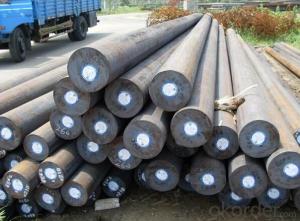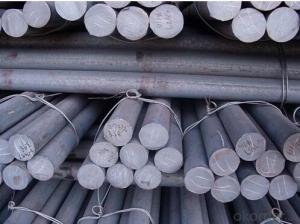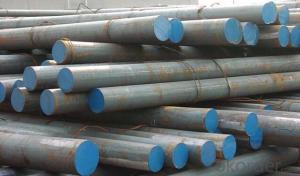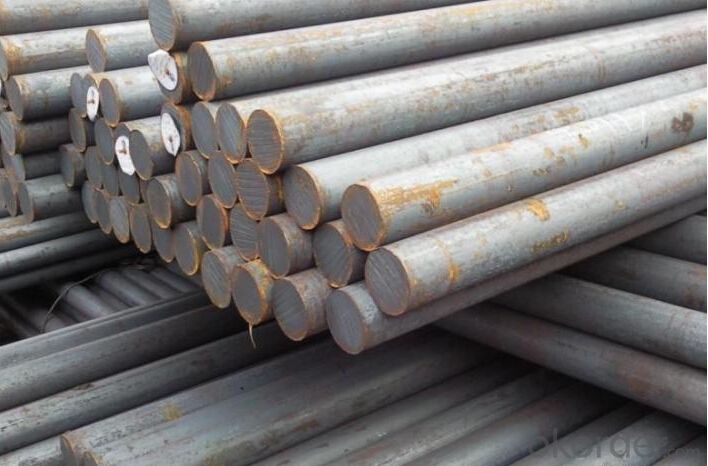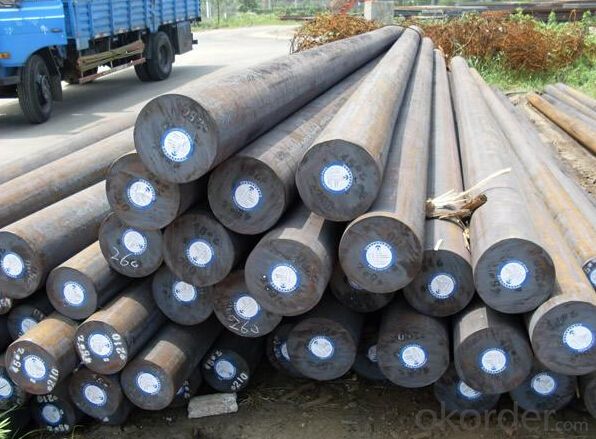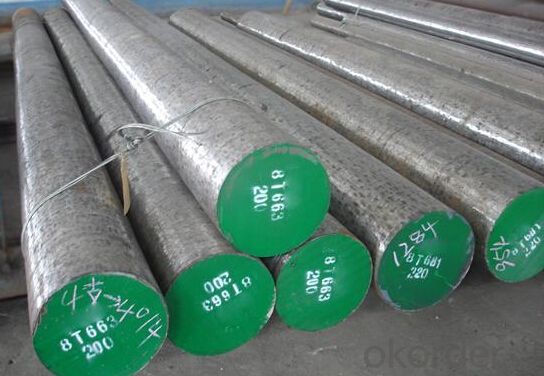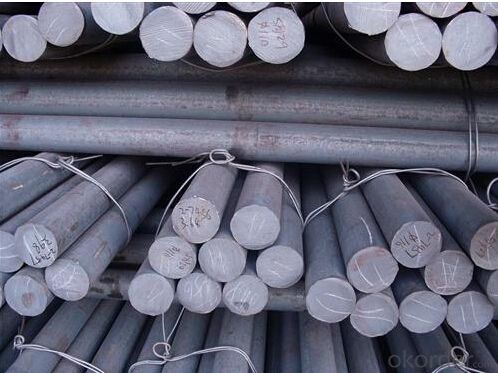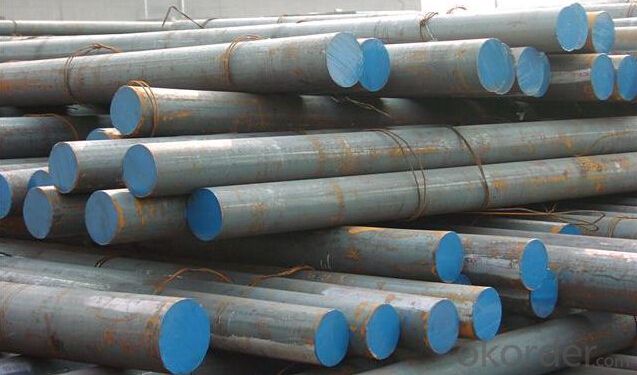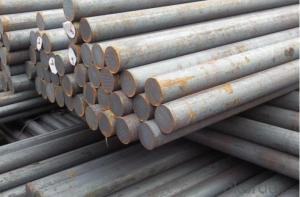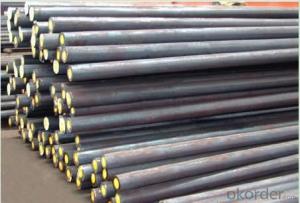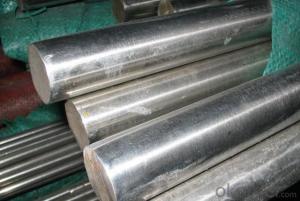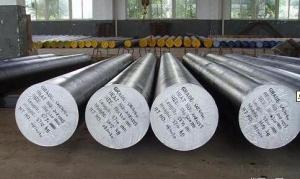Grade DIN34CrNiMo6(1.6582) Alloy Steel Round Bar
- Loading Port:
- Shanghai
- Payment Terms:
- TT OR LC
- Min Order Qty:
- 30 m.t
- Supply Capability:
- 10000 m.t/month
OKorder Service Pledge
OKorder Financial Service
You Might Also Like
Specification
Specifications of Round Bar
1. Alloy steel round bar
2. Dia:16mm~250mm
3. Length: 6m, 9m, 12m or as customer’s request
4. Tolerance: Within ±5% for weight; ±2mm for diameter
5. Note: The price can be better is the quantity is good
6. Equivement Grade:
DIN:34CRNIMO6
SAE:4340
JIS:SNCM439(SNCM8)
BS:817M40
UNI:40NiCrMo7
2. Chemical Composition
| C | Si | Mn | S | P | Cr | Ni | Cu | Mo |
| 0.37-0.44 | 0.17-0.37 | 0.50-0.80 | ≤0.025 | ≤0.025 | 0.60-0.90 | 1.25-1.65 | ≤0.025 | 0.15-0.25 |
Mechanical Property
Tensile Strength: σb (MPa):≥980(100)
Yeild Strength: σs (MPa):≥835(85)
Elongation: δ5 (%):≥12
Impact Force: Akv (J):≥78
Usage and Applications of Round Bar
1. Chinese standard steel bar is often used where large amounts of steel need to be formed, for example as structural steel.
2. And we can use this kind of product on the performance of the mechanical parts if the demand is not very high.
3. Steel round bar is used in construction and a large number of architectural and engineering structures.
Packaging & Delivery of Round Bar
Packaging Detail: All goods are packed in bundle with steel strips and shipped by break bulk vessel or container (depend on target market and different ports)
Delivery Detail: 15~45 days
Trade terms: FOB, CFR, CIF
MOQ: 30 metric tons per specification; we can negotiate the quantity if the specification is normal or we have stock of one specification.
Weight: Theprice invoicing on theoretical weight basis or actual weight basis depends on customer’s request.
Shipment: The shipment of bulk break or container is depends on customer’s request and the situation of the port of destination.
Documents given: Full set of original clean on board bill of lading; Original signed commercial invoice; Original packing list; Policy of insurance; Certificate of origin and what the target market needs.
Production Flow of Round Bar
1. The common processes are preheated forging quenching, dual refinement solution process, cooling quenching and isothermal quenching. We use heat treatment for dual refinement solution process.
2. Material prepare (billet) — heat up — rough rolling — precision rolling — cooling — packing — storage and transportation
FAQ:
Q1: Why buy Materials & Equipment from OKorder.com?
A1: All products offered byOKorder.com are carefully selected from China's most reliable manufacturing enterprises. Through its ISO certifications, OKorder.com adheres to the highest standards and a commitment to supply chain safety and customer satisfaction.
Q2: How do we guarantee the quality of our products?
A2: We have established an advanced quality management system which conducts strict quality tests at every step, from raw materials to the final product. At the same time, we provide extensive follow-up service assurances as required.
Q3: How soon can we receive the product after purchase?
A3: Within three days of placing an order, we will begin production. The specific shipping date is dependent upon international and government factors, but is typically 7 to 10 workdays.
Q4: What makes stainless steel stainless?
A4: Stainless steel must contain at least 10.5 % chromium. It is this element that reacts with the oxygen in the air to form a complex chrome-oxide surface layer that is invisible but strong enough to prevent further oxygen from "staining" (rusting) the surface. Higher levels of chromium and the addition of other alloying elements such as nickel and molybdenum enhance this surface layer and improve the corrosion resistance of the stainless material.
Q5: Can stainless steel rust?
A5: Stainless does not "rust" as you think of regular steel rusting with a red oxide on the surface that flakes off. If you see red rust it is probably due to some iron particles that have contaminated the surface of the stainless steel and it is these iron particles that are rusting. Look at the source of the rusting and see if you can remove it from the surface.
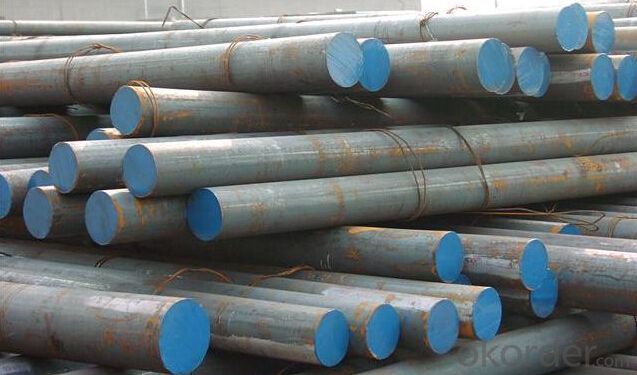
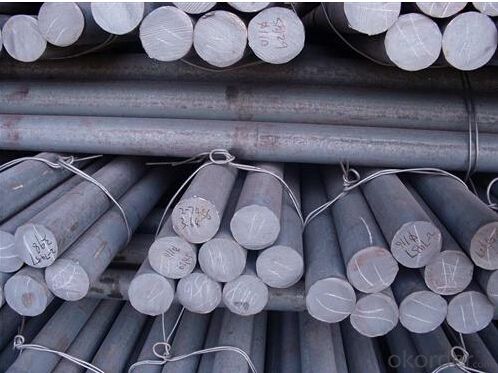
- Q: What are the factors that determine the cost of special steel?
- There are several factors that determine the cost of special steel. These include the raw material costs, manufacturing processes and techniques involved, the complexity of the steel composition, the market demand and supply, and any additional treatments or finishes required. Other factors such as transportation costs, import/export taxes, and industry regulations may also influence the overall cost.
- Q: How is precipitation-hardening steel used in aerospace applications?
- Precipitation-hardening steel is used in aerospace applications due to its excellent strength-to-weight ratio, corrosion resistance, and high temperature endurance. It is commonly used to manufacture various components like aircraft landing gear, engine parts, and structural elements. The steel's ability to be heat treated and aged to enhance its mechanical properties makes it ideal for aerospace applications, where strength, durability, and lightweight materials are crucial for safe and efficient flight operations.
- Q: How is high-strength stainless steel used in the production of structural components?
- High-strength stainless steel is used in the production of structural components due to its exceptional mechanical properties. Its high tensile strength, corrosion resistance, and durability make it an ideal material for constructing load-bearing parts such as beams, columns, and supports. Additionally, the stainless steel's ability to withstand harsh environments ensures the longevity and reliability of these structural components.
- Q: How does special steel contribute to reducing product rejection rates?
- Special steel contributes to reducing product rejection rates by offering superior quality and performance compared to regular steel. Its unique properties, such as increased strength, durability, and corrosion resistance, ensure that products made with special steel are more reliable and less prone to defects or failures. This, in turn, leads to a decrease in product rejection rates as it minimizes the likelihood of manufacturing errors, enhances product lifespan, and improves overall customer satisfaction.
- Q: Is special steel suitable for manufacturing molds and dies?
- Yes, special steel is highly suitable for manufacturing molds and dies. Special steel refers to a group of high-quality steels that possess exceptional properties such as high hardness, wear resistance, toughness, and excellent heat resistance. These characteristics make special steel an ideal choice for mold and die manufacturing. Molds and dies are critical components in various industries such as automotive, aerospace, electronics, and manufacturing. They are used to shape, form, and cut materials into desired shapes and sizes. Due to the repetitive and intense nature of their applications, molds and dies are subjected to high pressures, temperatures, and abrasive forces. Therefore, they need to be made from a material that can withstand these conditions while maintaining their dimensional stability and performance. Special steel, such as tool steel, is specifically designed to meet these requirements. It has a high hardness level, which enables it to resist wear and deformation, even under extreme conditions. This characteristic ensures that molds and dies made from special steel can maintain their shape and precision for a longer period, resulting in better product quality and reduced downtime for maintenance and replacement. Additionally, special steel offers excellent heat resistance, which is crucial for molds and dies used in high-temperature applications such as plastic injection molding or forging. It can withstand the thermal cycling and rapid heating and cooling associated with these processes without losing its mechanical properties or developing cracks or deformation. Moreover, special steel is known for its exceptional toughness, which is essential for molds and dies that are subjected to high pressures and impacts. It can absorb and distribute the applied forces, preventing premature failure and prolonging the lifespan of the molds and dies. In summary, special steel is highly suitable for manufacturing molds and dies due to its high hardness, wear resistance, toughness, and excellent heat resistance. Its exceptional properties ensure that molds and dies can withstand the demanding conditions of their applications, resulting in improved performance, longevity, and cost-effectiveness for manufacturers.
- Q: How is special steel used in the production of pressure vessels?
- Special steel is used in the production of pressure vessels due to its unique properties that make it suitable for withstanding high pressure environments. Pressure vessels are containers designed to hold gases or liquids at a pressure significantly different from the surrounding atmosphere. These vessels are commonly used in industries such as oil and gas, chemical, and power generation. The use of special steel in pressure vessel production is crucial to ensure the safety and reliability of these containers. Special steels, such as carbon steels, stainless steels, and alloy steels, offer enhanced mechanical properties, high strength, and excellent corrosion resistance. These properties are essential for withstanding the extreme pressure conditions experienced by pressure vessels. One of the primary functions of special steel in pressure vessel production is to provide resistance against internal pressure. The steel needs to be able to withstand the force exerted by the contents of the vessel without deforming or rupturing. The high strength and toughness of special steels make them capable of handling these pressures, ensuring the integrity of the vessel and preventing catastrophic failures. Special steel also plays a vital role in maintaining the structural integrity of pressure vessels. These vessels are subjected to various external loads, such as wind, seismic forces, and thermal expansion. The superior mechanical properties of special steel enable it to bear these loads without significant deformation or failure, ensuring the structural stability of the pressure vessel. Furthermore, special steel's resistance to corrosion is essential in the production of pressure vessels. Pressure vessels often contain corrosive substances, and the corrosive environment can lead to the degradation of the material over time. Special steels, especially stainless steels, offer excellent resistance to corrosion, minimizing the risk of material deterioration and maintaining the vessel's longevity. In summary, special steel is used in the production of pressure vessels due to its high strength, toughness, and corrosion resistance. These properties enable the steel to withstand high pressure conditions, maintain structural integrity, and prevent corrosion-related failures. By utilizing special steel, pressure vessel manufacturers can ensure the safety, reliability, and longevity of these critical containers.
- Q: Can special steel be used in the oil and gas equipment manufacturing industry?
- Yes, special steel can be used in the oil and gas equipment manufacturing industry. Special steels, such as stainless steel and alloy steel, are commonly utilized in this industry due to their superior corrosion resistance, high strength, and ability to withstand harsh operating conditions. These steels ensure the reliability and durability of oil and gas equipment, making them suitable for applications such as pipelines, valves, and drilling equipment.
- Q: What are the different methods for joining special steel components?
- There are several methods for joining special steel components, including welding, brazing, soldering, and mechanical fastening. Welding involves melting the base metals and adding a filler material to create a strong bond. Brazing and soldering use a lower melting point filler material to join the components. Mechanical fastening includes methods like bolts, screws, and rivets to hold the components together. Each method has its own advantages and is chosen based on the specific requirements of the application.
- Q: What are the different wear-resistant grades of special steel?
- There are several different wear-resistant grades of special steel, including but not limited to, AR400, AR500, AR600, Hardox 400, Hardox 450, Hardox 500, Hardox 600, Bisplate 400, Bisplate 450, Bisplate 500, Bisplate 600, and Creusabro 4000. These grades are specifically designed to withstand abrasive wear and impact, making them ideal for applications in industries such as mining, construction, and manufacturing.
- Q: Can special steel be used in tool manufacturing?
- Tool manufacturing can utilize special steel, which falls under a distinct steel category possessing unique properties and characteristics suitable for various applications, including tool production. To enhance its strength, hardness, and wear resistance, special steel is often alloyed with elements like chromium, molybdenum, or vanadium. In the realm of tool manufacturing, special steel frequently finds use in the creation of cutting tools, drills, dies, molds, and other tooling components. Its exceptional strength and hardness allow it to endure the rigorous conditions encountered during cutting, drilling, and shaping diverse materials. Furthermore, special steel exhibits excellent resistance to wear, heat, and corrosion, making it an ideal choice for tools that require long-lasting sharpness and performance. Additionally, special steel can undergo further processing and treatment through techniques like quenching and tempering to achieve specific levels of hardness and enhance overall performance. This versatility positions special steel as the preferred material for tool manufacturers who prioritize durable, precise, and long-lasting products. All in all, special steel has established itself as a reliable and effective material in tool manufacturing, enabling the production of high-quality tools that satisfy the requirements of various industries, ranging from automotive and aerospace to construction and manufacturing.
Send your message to us
Grade DIN34CrNiMo6(1.6582) Alloy Steel Round Bar
- Loading Port:
- Shanghai
- Payment Terms:
- TT OR LC
- Min Order Qty:
- 30 m.t
- Supply Capability:
- 10000 m.t/month
OKorder Service Pledge
OKorder Financial Service
Similar products
Hot products
Hot Searches
Related keywords


